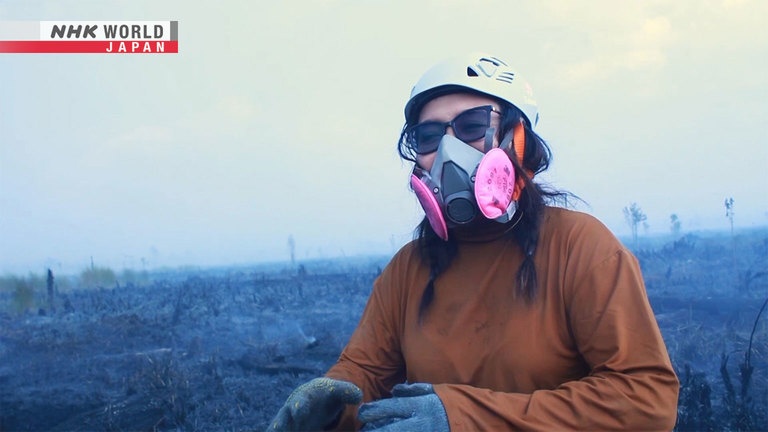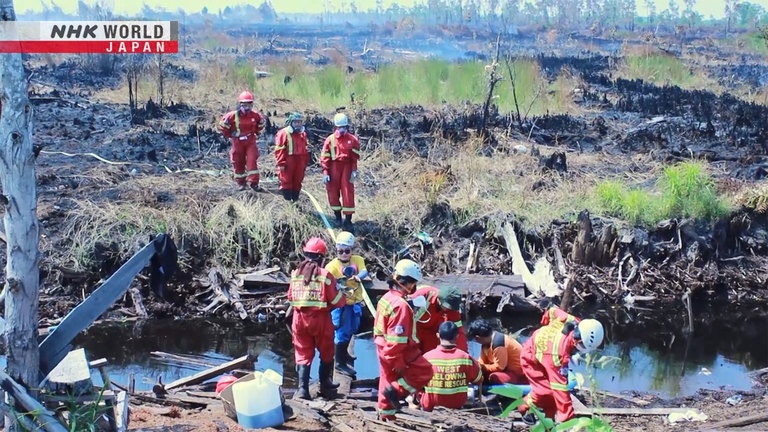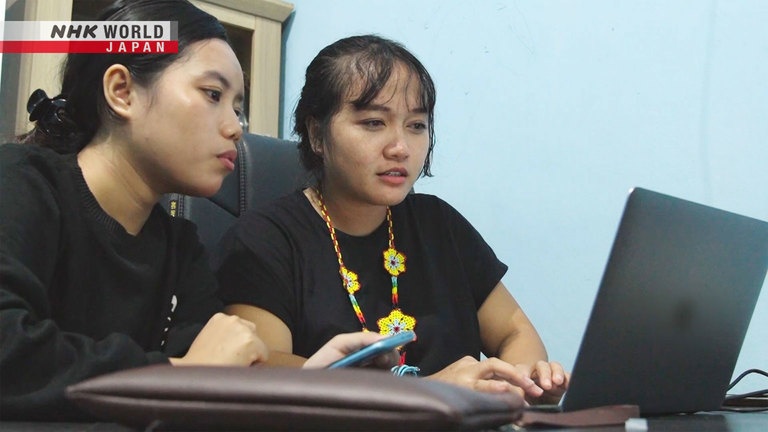Guardian of the Forest: Emmanuela Shinta / Founder of Ranu Welum Foundation
Emmanuela Shinta, a prominent Dayak leader in Kalimantan, established the Ranu Welum foundation in 2014 to serve as a platform for her advocacy for indigenous rights and environmental conservation.



Transcript
Direct Talk
For the past two decades,
Indonesia has been among the world's
top five countries for forest loss.
Kalimantan is known for
its rich biodiversity,
vast rainforests, and
diverse indigenous cultures.
However, its long history of
economic development programs
has fueled the island's deforestation.
Emmanuela Shinta, a prominent Dayak leader,
established the Ranu Welum Foundation in 2014
as a platform for advocating indigenous
rights and environmental conservation.
By amplifying their voices
in land use decisions,
Emmanuela Shinta empowers Dayak communities.
Her leadership fosters cultural pride
and environmental stewardship among youth,
while her reforestation initiatives
protect Kalimantan for future generations.
My people play a very important role
in protecting nature.
We are the guardians of the land.
We are the guardians of this rainforest,
which is more than 140 million years old.
Dayak people, indigenous to Kalimantan,
boast a rich cultural heritage
and strong connections to land.
However, recurring environmental
crises are posing growing threats.
Peatland fires are escalating
in both intensity and frequency,
emitting dense, suffocating haze
that envelops the region.
Prolonged exposure to this haze
may result in enduring health complications.
Meet Guardian of the Forest,
Emmanuela Shinta
who works to protect traditional lands
and empower her people,
ensuring their rights and heritage
are safeguarded for future generations.
All these crazy things
happen right now, in Kalimantan.
More trees cut down, more rivers polluted,
more violations of indigenous rights.
When people look at trees, they see
economic value, but for us Dayak...
We look at trees,
we look at forests, we see life.
Why? Because it's a connection
not only to our culture, to our identity,
but also to our ancestors.
So it's really important for us.
We, as Dayak people,
have a big respect for nature.
Dayak people live in harmony with the forest.
Dayak without forest is not a Dayak.
As part of a direct solution to Kalimantan's
climate and environmental problems,
Emmanuela Shinta is
mobilising youth to take action
and join the climate movement
through initiatives
that see her facilitating
volunteer firefighters,
producing films and social media posts
and working alongside forest rangers.
In doing this, Shinta and her team
have positioned themselves
at the front line of an environmental
battle taking place in Indonesia.
I feel it's really important and crucial
to engage Indigenous youth,
especially Dayak people who are
the first people of the land
to be involved in this movement to
restore and protect Kalimantan rainforests.
But then, I also saw that in Palangka Raya,
not only Dayak youths that come here to study,
but also the youths from other ethnic groups.
They love Kalimantan as well.
So the idea is why don't we engage this youth
to protect Kalimantan, to protect
the place where they are right now?
Dayak's wisdoms are useful for the land
and natural resources management,
and you can also show the evidence.
This is when you manage the land
with indigenous wisdom.
I think what I can do right now,
the best is to amplify it to the public
because I believe change is coming when
someone's change is like individual change.
Shinta's journey from humble beginnings
to her remarkable accomplishments
as a Dayak woman
illustrates how her
early struggles with identity
propelled her commitment
to change perceptions.
While her university experience
exposed her to diverse communities,
shaping her perspective,
it was during her formative years
that she faced discrimination
and misconception head-on.
Before my 17th birthday
I was ashamed of my indigenous identity.
Why? Because in the community,
when you talk with your mother tongue
it's like, oh, that's (an) alien language.
They look at you as someone different.
I am a Dayak but because I grew up
in an urban area where people thought that
being modern was cool
and being an indigenous is not cool
because it's not modern and it's traditional.
I kinda regret it.
But at the same time, I also
I think that's really good
because I know how to
reconnect with my culture, with my roots,
and I really hope I can help
other indigenous youth as well
to reconnect with their culture and not be
ashamed of their identity as indigenous person.
When I was maybe five or six years old,
my house got burnt.
And at the time, only me and
my mom were inside the house.
And even till now,
it's still like a traumatic event.
you know, like you are caught in the fire
and it's like you have to escape.
You have to flee for your life.
When we had these forest fires in 2015,
I kind of, you know,
recalled the same situations.
I was brought back to that moment
when I was six years old,
because Kalimantan is our home.
And imagine your home was burning.
You lost the place that you call -
this is my safe place, this is my home.
When I was a kid, I liked to run around
the forest and picking the wild fruits.
It's just an amazing experience,
and I really loved that moment.
But nowadays, whenever I saw this same fruit
and I tried to pick it and eat it,
the taste was totally different.
I still could remember in the past
when I ate that fruit,
the taste was really sweet.
And that's why I love it. That's why
it stayed with me until I became an adult.
But right now, the taste was so different.
It's plain and even bitter.
Awakened by the changing landscapes of her
homeland and her own inner transformation,
Shinta's journey took a pivotal turn
during a human rights training
where she witnessed
the pressing issues plaguing Kalimantan.
Fueled by a deep sense of responsibility as
an indigenous individual, she began to ponder.
If not us, then who?
Because it's a responsibility
for me as an indigenous person
to be a part of the solutions of all of
the problems that happened in my homeland.
Shinta's desire to be part of a solution
led to the creation of the
Ranu Welum Foundation in 2014.
It began as an indigenous filmmaking
community with a simple yet powerful idea:
to use audiovisual mediums
such as videos and social media
to amplify their voices and share
their stories from their unique perspective.
There is a lot of stigma out there.
There is a lot of misconceptions.
Dayak People are scary.
Dayak People are headhunters.
They eat human flesh.
All this stigma comes to us whenever
people meet us and then they will think,
oh, we just live in the forest
and we are like less human, right?
So that's why we make videos.
We have to tell them this is our life,
this is what happens with us.
Shinta's organisation produces documentaries
focusing on themes of hope and resilience,
shedding light on issues
related to environmental conservation,
indigenous rights, and community empowerment.
Additionally, they report on necessary actions
to combat forest fires and toxic haze.
Right now, we really need urgent actions,
immediate actions.
The local communities are at the front line
in the environmental battle...
The 2015 peatland forest fires in Kalimantan
caused dense, long-lasting haze
due to high carbon content.
This haze affected local communities
and spread to neighbouring countries
like Singapore and Malaysia.
It led to hazardous air pollution,
health issues,
flight cancellations,
and economic disruptions.
At the time there was not enough coverage
from Indonesia's mainstream media
about forest fires in Kalimantan.
At the time all the attention went to Riau.
Why? Because Riau is next to Singapore,
because it's like, becoming a problem
between the countries, right?
But Kalimantan,
who knows the air pollution, at the time
equal to smoking 672 cigarettes in a day,
no one talked about it
but we made a video about it.
We posted it on social media
and then that's how it got viral
and people started to have attention
to Kalimantan and start to send help.
We found it really effective
because in just two months
we are able to reach more than 500,000 people.
It's people, not views.
And that's also how we are able to
raise awareness and be able to get attention
and give a bit of pressure to the government
to do immediate actions about the fires.
In response, Shinta and her team
set up the Youth Act movement.
We always say, everyone can be an activist,
everyone can talk about climate.
Being an activist or environmentalist
is not a fancy thing,
it's not an exclusive thing.
Everyone can do that.
As long as you love this earth,
you love nature and you want to protect it.
We mobilise youth for climate actions
to involve in restoration efforts
and also to join in climate activism.
So we have these young people that have
the backgrounds on how to use the smartphone
to take videos or
to tell their stories, right.
That's how we make people relate
to our causes because it's a personal story.
It's not just like activism
because you want to be activists,
but it's the story from the Dayak people,
young people in Kalimantan
that really experience this calamity
because of the environmental problems.
Shinta and the Ranu Welum Foundation,
now have more than 3000 volunteers
and more than 1000 official
members in their network.
When you start to talk about
environmental problems,
sometimes it can be very risky for you.
It can be dangerous work as well.
I work with the youth and
I don't want to put them in dangers.
But they have the heart
to protect Kalimantan.
So how we do that?
We always talk about this issue
from the perspective of indigenous persons
and in the form of storytelling.
We don't want to just putting
the fingers pointing to this person,
that person, that party,
as the wrong party for all these situations.
Shinta and her organisation have established
and expanded youth activism networks,
focusing particularly on reforestation
efforts among other key activities.
We do not only plant trees,
but we also monitor and track it.
So we have this system
where we track the trees.
The pictures uploaded, and we can know
how many trees that you already planted.
So that's the system that we use
in our tree-planting programs.
Despite safeguarding
80% of global biodiversity,
indigenous peoples receive
less than 1% of climate funding.
This disparity poses significant challenges
for Kalimantan's Indigenous youth,
who grapple with the impacts of climate change
and environmental degradation
resulting from unsustainable practices.
And in the midst of scepticism
towards youth activism,
Shinta stresses
the urgency of their struggle.
At the policy level, I myself
attend meetings of decision-making,
make recommendations,
raising the indigenous voices
not only in national level
but also regional and the UN level.
But we did not really (get) involved
in the process of decision-making
for locals and nationals.
I think that's the challenge.
I attended COP-28 in Dubai,
and I addressed questions
related to climate funding,
direct funding to support the local
communities and grassroot communities
who are at the frontline
of the environmental battle.
Shinta's ability to bridge modern and
traditional landscapes as an indigenous woman
plays a crucial role in
advocating for indigenous rights
and environmental conservation.
Her participation at international events
has contributed to securing funding
for local communities
and ensuring local Dayak voices
are heard on the world stage.
People want to support indigenous
communities with direct funding
because they know the solutions
should come from the ground up.
Imagine we have thousands of fighters,
climate fighters here on the ground, and
we need resources to continue our work.
So we can do more restoration programs,
we can plant more trees,
we can help more communities,
and we can continue protecting Kalimantan
with forest mapping, with firefighting.
You know, a lot of things here,
but we really need that support.
I really hope this can change in the future
because I believe this is the right timing
to accelerate the support
for the local initiatives and grassroots
communities in this time of climate crisis.
This is my home, this is the place
where I live and my loved ones live too.
So we just need to take action.
We have firefighters, we have forest rangers,
we have indigenous filmmakers, we have
green warriors, the restoration leaders.
And that's something
that I never imagined before.
So I'm so proud of
what we have achieved so far.
As the world grapples with
pressing environmental challenges,
Emmanuela Shinta believes that
indigenous youth are essential
in ensuring that traditional wisdoms
remain relevant and valued in modern society.
What I want to say to the world is
solutions should come from
the ground and everyone is a leader.
And I believe that
indigenous youth are the bridges
between modern technology
ancient wisdom, between global policy
and local implementations,
and between great visions and real action.